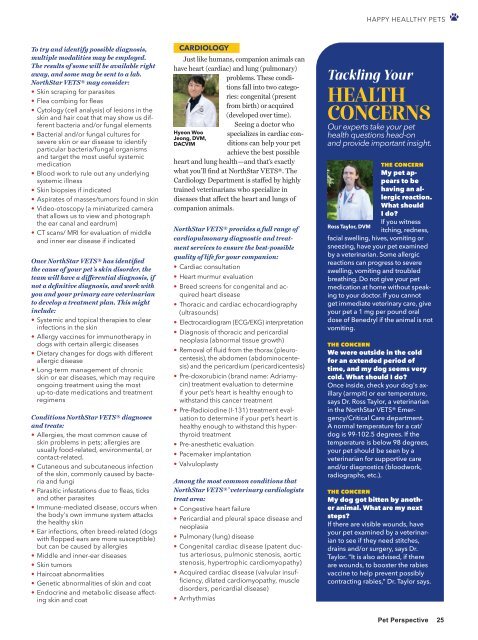2023_NorthStarVets_Pets_Digital_Issue
Create successful ePaper yourself
Turn your PDF publications into a flip-book with our unique Google optimized e-Paper software.
HAPPY HEALLTHY PETS<br />
To try and identify possible diagnosis,<br />
multiple modalities may be employed.<br />
The results of some will be available right<br />
away, and some may be sent to a lab.<br />
NorthStar VETS® may consider:<br />
• Skin scraping for parasites<br />
• Flea combing for fleas<br />
• Cytology (cell analysis) of lesions in the<br />
skin and hair coat that may show us different<br />
bacteria and/or fungal elements<br />
• Bacterial and/or fungal cultures for<br />
severe skin or ear disease to identify<br />
particular bacteria/fungal organisms<br />
and target the most useful systemic<br />
medication<br />
• Blood work to rule out any underlying<br />
systemic illness<br />
• Skin biopsies if indicated<br />
• Aspirates of masses/tumors found in skin<br />
• Video-otoscopy (a miniaturized camera<br />
that allows us to view and photograph<br />
the ear canal and eardrum)<br />
• CT scans/ MRI for evaluation of middle<br />
and inner ear disease if indicated<br />
Once NorthStar VETS® has identified<br />
the cause of your pet 's skin disorder, the<br />
team will have a differential diagnosis, if<br />
not a definitive diagnosis, and work with<br />
you and your primary care veterinarian<br />
to develop a treatment plan. This might<br />
include:<br />
• Systemic and topical therapies to clear<br />
infections in the skin<br />
• Allergy vaccines for immunotherapy in<br />
dogs with certain allergic diseases<br />
• Dietary changes for dogs with different<br />
allergic disease<br />
• Long-term management of chronic<br />
skin or ear diseases, which may require<br />
ongoing treatment using the most<br />
up-to-date medications and treatment<br />
regimens<br />
Conditions NorthStar VETS® diagnoses<br />
and treats:<br />
• Allergies, the most common cause of<br />
skin problems in pets; allergies are<br />
usually food-related, environmental, or<br />
contact-related.<br />
• Cutaneous and subcutaneous infection<br />
of the skin, commonly caused by bacteria<br />
and fungi<br />
• Parasitic infestations due to fleas, ticks<br />
and other parasites<br />
• Immune-mediated disease, occurs when<br />
the body's own immune system attacks<br />
the healthy skin<br />
• Ear infections, often breed-related (dogs<br />
with flopped ears are more susceptible)<br />
but can be caused by allergies<br />
• Middle and inner-ear diseases<br />
• Skin tumors<br />
• Haircoat abnormalities<br />
• Genetic abnormalities of skin and coat<br />
• Endocrine and metabolic disease affecting<br />
skin and coat<br />
CARDIOLOGY<br />
Just like humans, companion animals can<br />
have heart (cardiac) and lung (pulmonary)<br />
problems. These conditions<br />
fall into two categories:<br />
congenital (present<br />
from birth) or acquired<br />
(developed over time).<br />
Hyeon Woo<br />
Jeong, DVM,<br />
DACVIM<br />
Seeing a doctor who<br />
specializes in cardiac conditions<br />
can help your pet<br />
achieve the best possible<br />
heart and lung health—and that’s exactly<br />
what you’ll find at NorthStar VETS®. The<br />
Cardiology Department is staffed by highly<br />
trained veterinarians who specialize in<br />
diseases that affect the heart and lungs of<br />
companion animals.<br />
NorthStar VETS® provides a full range of<br />
cardiopulmonary diagnostic and treatment<br />
services to ensure the best-possible<br />
quality of life for your companion:<br />
• Cardiac consultation<br />
• Heart murmur evaluation<br />
• Breed screens for congenital and acquired<br />
heart disease<br />
• Thoracic and cardiac echocardiography<br />
(ultrasounds)<br />
• Electrocardiogram (ECG/EKG) interpretation<br />
• Diagnosis of thoracic and pericardial<br />
neoplasia (abnormal tissue growth)<br />
• Removal of fluid from the thorax (pleurocentesis),<br />
the abdomen (abdominocentesis)<br />
and the pericardium (pericardicentesis)<br />
• Pre-doxorubicin (brand name: Adriamycin)<br />
treatment evaluation to determine<br />
if your pet’s heart is healthy enough to<br />
withstand this cancer treatment<br />
• Pre-Radioiodine (I-131) treatment evaluation<br />
to determine if your pet’s heart is<br />
healthy enough to withstand this hyperthyroid<br />
treatment<br />
• Pre-anesthetic evaluation<br />
• Pacemaker implantation<br />
• Valvuloplasty<br />
Among the most common conditions that<br />
NorthStar VETS®’ veterinary cardiologists<br />
treat area:<br />
• Congestive heart failure<br />
• Pericardial and pleural space disease and<br />
neoplasia<br />
• Pulmonary (lung) disease<br />
• Congenital cardiac disease (patent ductus<br />
arteriosus, pulmonic stenosis, aortic<br />
stenosis, hypertrophic cardiomyopathy)<br />
• Acquired cardiac disease (valvular insufficiency,<br />
dilated cardiomyopathy, muscle<br />
disorders, pericardial disease)<br />
• Arrhythmias<br />
Tackling Your<br />
HEALTH<br />
CONCERNS<br />
Our experts take your pet<br />
health questions head-on<br />
and provide important insight.<br />
the concern<br />
My pet appears<br />
to be<br />
having an allergic<br />
reaction.<br />
What should<br />
I do?<br />
If you witness<br />
Ross Taylor, DVM<br />
itching, redness,<br />
facial swelling, hives, vomiting or<br />
sneezing, have your pet examined<br />
by a veterinarian. Some allergic<br />
reactions can progress to severe<br />
swelling, vomiting and troubled<br />
breathing. Do not give your pet<br />
medication at home without speaking<br />
to your doctor. If you cannot<br />
get immediate veterinary care, give<br />
your pet a 1 mg per pound oral<br />
dose of Benedryl if the animal is not<br />
vomiting.<br />
the concern<br />
We were outside in the cold<br />
for an extended period of<br />
time, and my dog seems very<br />
cold. What should I do?<br />
Once inside, check your dog's axillary<br />
(armpit) or ear temperature,<br />
says Dr. Ross Taylor, a veterinarian<br />
in the NorthStar VETS® Emergency/Critical<br />
Care department.<br />
A normal temperature for a cat/<br />
dog is 99-102.5 degrees. If the<br />
temperature is below 98 degrees,<br />
your pet should be seen by a<br />
veterinarian for supportive care<br />
and/or diagnostics (bloodwork,<br />
radiographs, etc.).<br />
the concern<br />
My dog got bitten by another<br />
animal. What are my next<br />
steps?<br />
If there are visible wounds, have<br />
your pet examined by a veterinarian<br />
to see if they need stitches,<br />
drains and/or surgery, says Dr.<br />
Taylor. “It is also advised, if there<br />
are wounds, to booster the rabies<br />
vaccine to help prevent possibly<br />
contracting rabies,” Dr. Taylor says.<br />
Pet Perspective 25
















